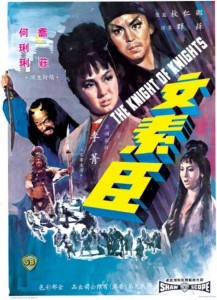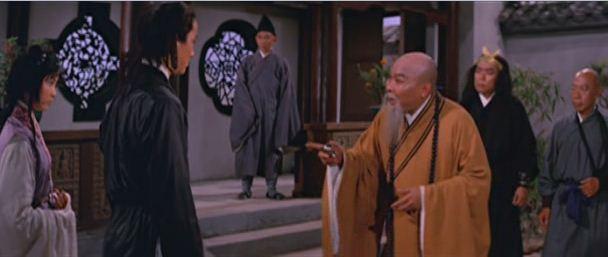Written by Chang Cheh
Directed by Sit Kwan
Hong Kong. 1966
Among the many amusing commonalities between Shaw Brothers studio films are kinetic nature of the scripts which so often have their characters venture from place to place in a series of episodic adventures whose connective tissue is, all too often, a bit vague. Political uprising, heists, warring schools, clans or families vying for sense of ‘regional supremacy,’ the stories do become familiar once a fan watches a certain number of these movies. It is really the smaller pieces that make up the whole which stand out. Chang Cheh, as one of the most prolific filmmakers the studio ever had, was certainly no stranger to films that dealt slightly schizophrenic plots. Best known for his efforts while sitting in the director’s chair in the 1970s, in the 1960s he had not quite attained the lofty status he would eventually be known for. For The Knight of Knights he served as screenwriter, while Sit Kwan handled directing duties.
The majestic Quihong Buddhist temple is under the suspicious eyes of the country’s authorities. Its abbot, Minkong (Tang Ti) is believed to be no more than a hoodlum hoping to secure, what else, some highly coveted regional power alongside the province’s current governor, Wang (Lee Wang-Chun), also targeted by investigations for corruption. Five brothers from the same clan attempt to infiltrate the fortress one night to foil Minkong’s plans, but the latter’s forces and booby-traps prove too many. Each brother falls to his death although the last one manages to at least escape the temple’s guard walls just as a mighty warrior ally, Wen Suchen (Kiu Chong), happens to pass by. The brother’s death proves to be the lighting rod necessary for Suchen to spring into action by pretending to be a young student hoping to learn poetry at the temple. Minkong and his senior monks, while not entirely certain of their guests true intentions, provide the benefit of the doubt in allowing him to stay…
Following yet another beautifully rendered credit sequence featuring hand drawn images of the places and characters viewers are about to discover over the next hour and a half, director Sit Kwan sends viewers on a pretty wild ride, from the book halls of the Buddhist temple currently overrun by gangsters, the deadly hilltops of the local village where a terrorist attack almost leads to the death of the region’s chief inspector, to the underground caverns beneath the temple where women slaves perform all sorts of chores to relax and sooth their ungrateful captors, from massages to sex. What the film lacks in terms of story cohesion it more than makes up for in playfulness and pacing. The film never remains in the same place or very long, jumping to the next action set piece. Even some scenes that one thinks will take a breather, such as when inspector Lin is finally introduced, another sword fight is thrown into the mix. Overkill? Perhaps, but the choreography is nice and lean and the deaths are frequently entertaining or how over the top they are (like one poor fellow who has a sword lodged into his face).
While the general storyline is concerned with the search of a written pact proving the alliance between governor Wang and Abbott Minkong, a piece of evidence that would help authorities prosecute both parties, the movie allows itself to indulge in the many smaller episodes it has to offer, not all of which are properly developed, yet several of which enhance the mood of the film for how racy or creative they are. Near the beginning of the film it is revealed that not only are the villains using the Buddhist temple as their base of operations for further attacks, the caverns below are where they keep a band of women they kidnapped and use as slaves. Any husbands who dare retrieve their wives are also held prisoner and brutally tortured. The segment dealing with the slavery issue only lasts approximately ten minutes or so and, once resolved, is never brought up again, which only reminds the viewer of how flippant these scripts often are about the logical progression of their stories. Despite that, it is still a great example of how much the filmmakers wanted to expand the worlds in which these stories take place with great set designs and provocative revelations. Yet another mini story begins with barely twenty minutes left in the film and has Wen Suchen and inspector Lin’s daughter, Lin Hong Su (Lily Ho Li-li), fall in love after Suchen rescues her from Minkong’s clutches. There was no hint whatsoever up until that point that the film would feature a love story, it just happens. To top it off, there is even a musical number in which both stars ‘think’ the words to the song in which they express the feelings they have for one another. Episodes like the the ones in Knight of Knights may not add up to much for the overall plot, yet they succeed in giving the movie an extra kick of flavour.
It helps of course that the cast is strong and having a good time playing their parts. Kiu Chong, as Wen Suchen, is the perfect hero, displaying a great sense of nobility and selflessness. He not only looks the part of a ‘good guy,’ the enthusiasm in the performance goes a long way to developing Wen Suchen as a man who actively wants to help others and sacrifice himself whenever need be. His primary foe, Abbott Minkong is played by the charismatic Tang Ti. Interestingly enough, he downplays his character’s evil nature to a degree. Even though he possesses cruel intentions, he approaches each challenge to the mission with caution, avoiding, at all costs, rash decisions. Tang Ti is not a very physically imposing presence, his weapon of choice is strategy. Any movie with Lee Wang-Chun as a heavy receives a critical shot in the arm. Lee basically made a career out of playing slimy, conniving villains who put on kind, appeasing faces in the before their unsuspecting enemies just prior to striking them down. Cliff Lok and Chow Lung-Cheung, as Wen’s two nimble helpers Wung Lung and Wen Hu, sadly do not get the amount of screen time they really deserve because both are terrific in their small roles (and have oddly feminine hairstyles). Lily Ho Li-li is another recognizable face among the cast members and can always be counted on for filling the role of the leading lady, even though in the case of Knight of Knights her character does not appear until at least half way into the story.
Director Sit Kwan and screenwriter Chang Cheh serve up an entertaining romp overall. There is definitely some entertainment value to be had even though their efforts are not enough for The Knight of Knights to stand out from the sea of martial arts adventures in any spectacular way.
-Edgar Chaput




